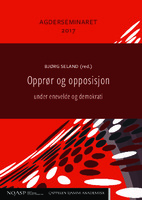Opprør og opposisjon under enevelde og demokrati
Abstract
"This book addresses political conflicts in Norway through an extended time span, from the late autocracy of the 18th century until the democratic challenges of today. The book holds eight articles focusing on historical phases which have been particularly influenced by social and political mobilization. Thus, the book traces an oppositional tradition across borders in time and space. Although the articles are based on limited studies, the authors write with ambition to include their research into this wider context.
In Norway, the Constitution of 1814 marks the shift from autocratic rule to early democracy. 18th century peasant riots may be interpreted as expressions of impotence of the common people, but also as an opportunity for action with the potential to influence the authorities. The 19th century peasant opposition shows the potential for change through parliamentary representation. Around 1850 the first attempts at worker’s organizations were criminalized – around 1950, however, the Labour Party dominated Norwegian politics. These trending lines reflect an increasingly developed democracy. The political system is in principle opening for broad popular participation. However, democracy is still being challenged by opposition in ways and by means that occasionally raise concerns about the stability of our political culture.
The book is divided into three parts. Part I is dedicated to the age of late autocracy, part II provides insights into the 19th century democratization processes, while Part III includes articles dealing with opposition and confrontations in the last century, focusing the interwar period, the 1970s, and today's multicultural society.The book is aimed both at researchers, students and the general audience." "Denne boka tar opp politiske konflikter i Norge gjennom et langt tidsspenn, fra det seine eneveldet til vår tids demokratiske utfordringer. De åtte kapitlene representerer punktnedslag i historiske faser som i særlig grad har vært preget av sosial og politisk mobilisering. Slik bidrar boka til å belyse en opposisjonell tradisjon.
Historikere er blitt kritisert for å fokusere ensidig på avgrensede perioder og hendelser, og være for lite opptatt av å spore linjer på tvers av grenser i tid og rom. Forfatterne av denne boka skriver med bakgrunn i avgrensede studier, men alltid med ambisjon om å sette sine forskningstema inn i en videre kontekst.
I Norge markerer Grunnloven av 1814 skiftet fra eneveldig styre til begynnende demokrati. 1700-tallets bondeopprør kan tolkes som uttrykk for allmuens avmakt, men også som handlingsrom med potensiale til å påvirke myndighetene. 1800-tallets bondeopposisjon viser mulighetene for å nå fram gjennom parlamentarisk opposisjon. Rundt 1850 ble de første forsøk på organisering av arbeidere kriminalisert – rundt 1950 dominerte Arbeiderpartiet norsk politikk. Dette er linjer som speiler et stadig mer utviklet demokrati. Det politiske systemet åpner i prinsippet for bred folkelig medvirkning. Men fortsatt blir demokratiet utfordret av opposisjon i ytringsformer som til tider vekker bekymring for stabiliteten i vår politiske kultur."
Keywords
Norwegian political history; social mobilization; political moblilization; political historym; Agderseminaret; opprør; opposisjon; politisk historie; politisk motstand; sosial mobilitetDOI
10.23865/noasp.46ISBN
9788202626020OCN
1083018550Publisher website
https://www.cappelendamm.no/Publication date and place
Oslo, 2018Classification
History
History and Archaeology
20th century, c 1900 to c 1999


 Download
Download